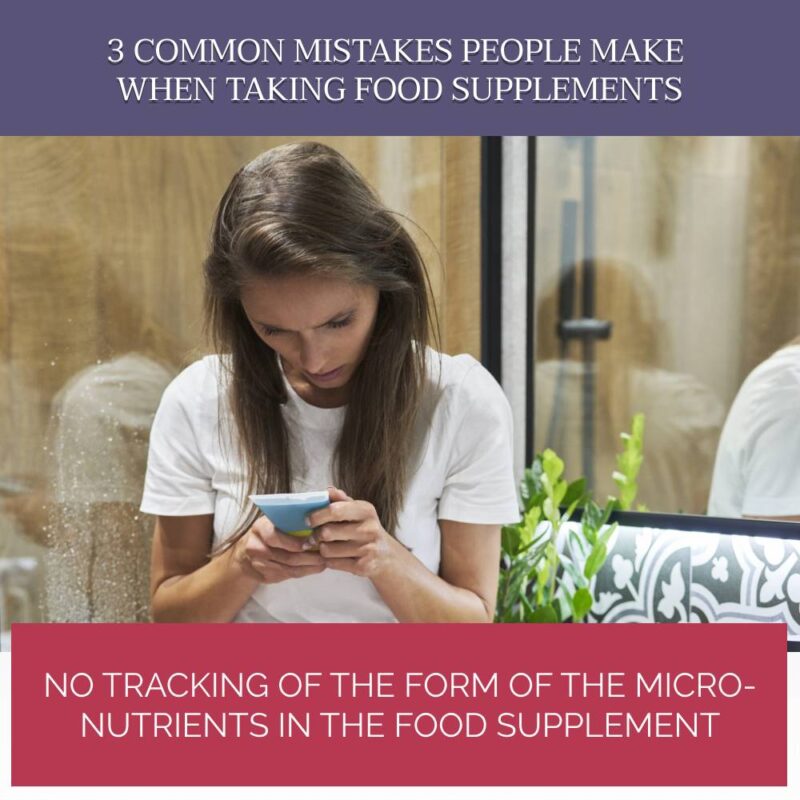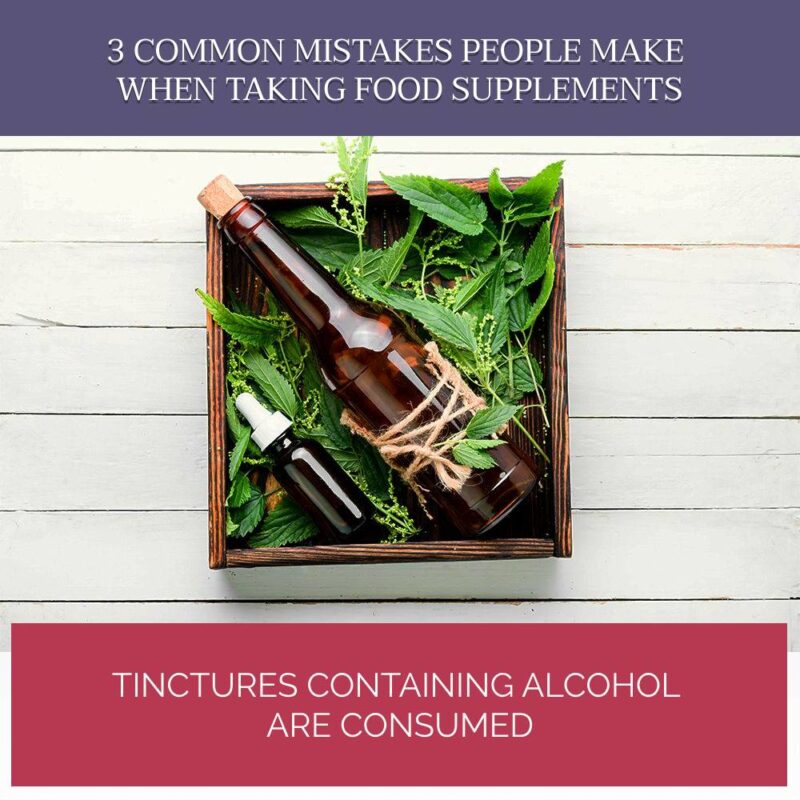Food supplements have been with us for a long time – you could say millennia. But the 21st century. Technological advances in the 21st century have given us the opportunity to market more supplements than ever before, and to invent new forms and ways of administering them. The world of supplements has grown vast and contains many conflicting opinions and habits. In order to successfully navigate the many possibilities and dangers, it is good to be aware of how to recognise and avoid common mistakes in relation to supplements.

Common mistake No 1
Supplements taken at the same time as fatty foods
Fat prevents nutrients from moving freely around our bodies and being absorbed well. Many people don’t realise that this is something they should be paying attention to, which is why they don’t know how to time their supplements properly – that is, not around the time they eat fatty or overly protein-rich foods.
Eating fatty foods prevents nutrients from circulating in the blood and entering cells. Glucose, on the other hand, is crucial for the transport of nutrients. According to Anthony William (author of the ‘Medicine Media’ series of books), nothing can move in and out of a cell without glucose.
So it’s a good idea to take supplements with glucose, such as banana or honey (some products, such as Vimergy supplements, already have glycerol added for this reason). Even potatoes have enough suitable glucose. Fatty foods – including nuts, coconut, plant-based milk, etc. – should be consumed separately from food supplements. Supplements can be absorbed with fat, but the process is impaired and the benefits of supplementation are certainly not maximised.
Suggestion: take supplements in the morning before eating fatty foods. (If you drink celery juice, take it 30 minutes after drinking the juice). Another good option is to take supplements in the evening before going to bed, ideally 1-2 h after the last fatty meal.
Some supplements, such as EPA/DHA (vegan omega-3) and vitamin D-3, also contain fat and are fat soluble. So these are exceptions. However, most supplements work best when there are no distractions in the form of fats and there is plenty of fructose in the blood.

Common mistake No 2
No tracking of the form of the micronutrients in the food supplement
There is also a lot of confusion about the form of nutrients. There is a lot of confusing and contradictory information, and if someone recommends that you start taking vitamin B-12, it’s very legitimate to ask: which one? Which brand is it? Of the thousands of different options, which is the most effective, the purest and the highest quality?
Which vitamin B-12 should I take?
Measuring B-12 levels is a fairly common thing to do when getting a blood test. If it happens to be low, it is certainly recommended to start taking more. Usually, it is simply recommended to pick up a product from the pharmacy, without paying much attention to form and quality – as long as the package says B-12 and contains the right amount of vitamin B-12.
But if you want to take a more informed approach, know that the best absorbed form of B-12 is a mixture of methylcobalamin and adenosylcobalamin.
So next time you buy a food supplement, read the packaging or leaflet to find out what form of the nutrient is used. Here are a few more examples of well-absorbed and -functioning forms:
- for B-12 – a mixture of methyl and adenosylcobalamin
- for zinc – liquid zinc sulphate
- For magnesium – magnesium glycinate. Magnesium malate and some magnesium taurate are also suitable, but again magnesium citrate is not recommended.
- Folic acid/folate/B9 – The best absorbed form is methyl folate or 5-MTHF. Folic acid is a synthetic form of folate that is not usable by the body until it has been converted to methyl folate by the liver.
Tip: Next time you buy a food supplement, read the product information and make sure that the micronutrient it contains is in a form that is easily digestible. If you don’t know which form is well tolerated, we recommend you consult your doctor or look up the information in the books of the Medical Journal.

Common mistake No 3
Tinctures containing alcohol are consumed
Alcoholic tinctures have historically played an important role. A couple of hundred years ago, when modern technology was not available, it was one of the few ways to make good quality tinctures.
With all due respect to folk medicine and the wisdom of their ancestors, they did and acted according to the times. But the fact that they did so does not necessarily mean that it was of maximum benefit to our health. At the time, it seemed to be more a survival step. Freeze-drying technology and other modern clean production methods had not yet been found.
Today we already know the effects of alcohol on the body. The first reason we recommend avoiding it in tinctures and supplements is that alcohol – even in small amounts – is very destructive to our liver health. Alcohol makes our livers sluggish and damages liver cells, reducing the liver’s ability to synthesise vitamins and minerals. All of the more than 2,000 chemical functions that the liver carries out are impaired.
Another thing to know is that alcohol neutralises the effect of the food supplement. Therefore, if you take an alcohol-based tincture, the food supplement inside will have no effect on your body. Instead of nutrients, the liver will simply get mild alcohol poisoning.
And the last reason is that corn-based alcohol is commonly used in the food and pharmaceutical industry – this corn is very likely to be GMO or GMO contaminated corn(by the way – the same goes for citric acid, which is produced from GMO corn).
Recommendation: if you are looking for remedies, take a close look at the product label. Look for alcohol-free supplements. Check that the product does not contain alcohol, often listed as ethanol.
Carelessly manufactured food supplements give the whole world of food supplements a bad name
Let’s say you buy a food supplement on a friend’s recommendation. For example, a friend has recommended that you take zinc, which is supposed to help your body fight viruses. But you don’t have any more information about which zinc to take – you stand in front of the supplement counter in a shop or pharmacy, wondering which one to choose. You can’t figure out what form of zinc you should choose, so you end up picking up some zinc capsules without paying attention to whether they contain alcohol, citric acid or other unnecessary chemical additives.
The worst case scenario is that you get a few setbacks – diarrhoea or feeling unwell – from taking the supplement. In the best case, you simply don’t feel any health effects, positive or negative.
Anyway, you have not found a solution to your problem and you conclude that supplements are pointless, don’t work and are a waste of money.Unfortunately, these situations happen all too often and make people constantly sceptical about supplements. It’s a shame, because a good quality, pure supplement can have an incredibly beneficial effect on your body!
Hopefully, the next time you’re looking for or taking a supplement, you’ll be a little more aware of the potential pitfalls that prevent you from getting the most out of it. It’s entirely possible that you already knew these pitfalls – in which case, repetition is the mother of wisdom.
Sources:
Medical media Anthony William’s books and website www.medicalmedium.com
The information provided in this article is for informational purposes only; it is not medical advice, diagnosis or treatment. If you have any health problems, you should consult a doctor or health professional. If you would like to use alternative or novel treatments to support your health, please discuss this information with your doctor. Take a booklet to him or her and discuss whether and how therapeutic foods and supplements could be used to help you heal.









